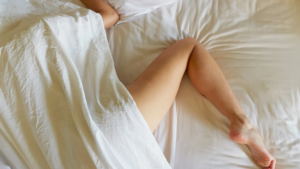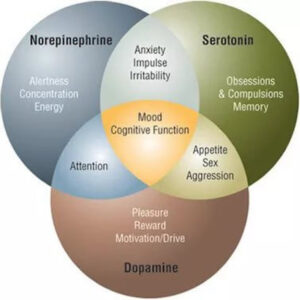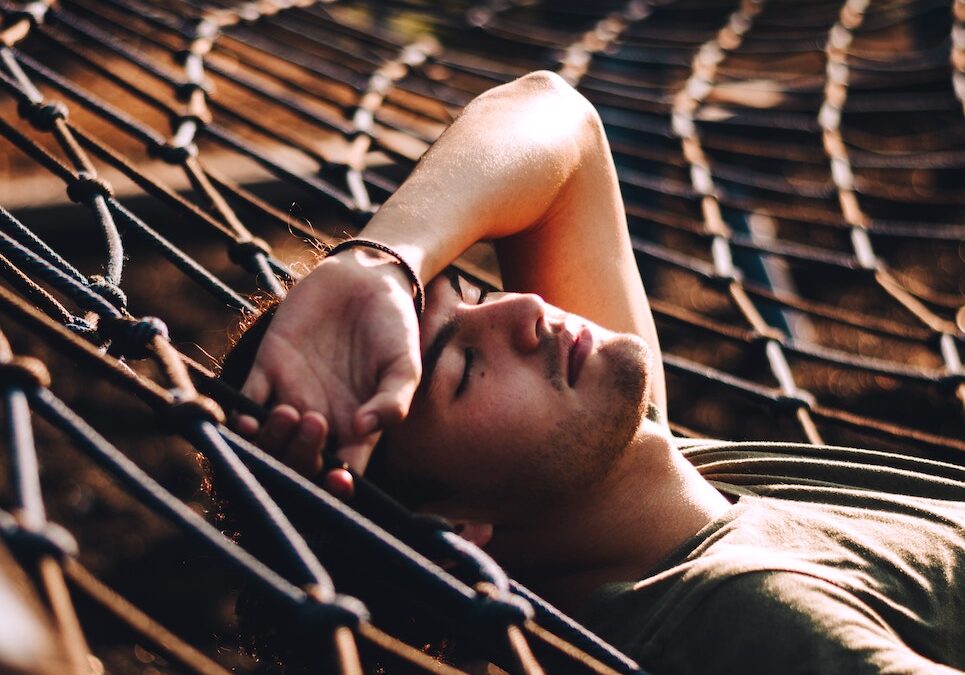“A cool breeze stirred my hair at that moment, as the night wind began to come down from the hills, but it felt like a breath from another world.” –Francis Marion
Happy Midsummer!
The warmth of summer is usually welcomed with open arms, but we often forget how difficult it can be to get a decent night’s sleep when nighttime temperatures rise.
Now that it’s August, getting a good night’s sleep during the hot nights of Summer can be extremely challenging. Tossing and turning all night due to a warm body and environment is disturbing on many levels.
Despite the seasonal warmth, climate change is real, and heat waves are occurring more frequently and are known to affect nighttime temperatures. Ambient temperature changes affect body temperature and sleep quality.
If you find that your sleep patterns vary with the seasons, then you are not alone. Changing seasons can impact everything from your mood and sleep duration to the frequency of sleep abnormalities.
Yet, even though many of these environmental variables are outside your control, there are alchemical wellness rituals you can do to promote better sleep—even in the Dog Days of Summer.
Dog Days Are Here
The “Dog Days of Summer” have arrived. For us in the Northern Hemisphere, these are the hottest and most unbearable days of the season.
The phrase is a reference to Sirius, the Dog Star. During the “Dog Days” period, the sun occupies the same region of the sky as Sirius, the brightest star visible from any part of Earth. Sirius is a part of the constellation Canis Major, the Greater Dog.
Sleeping comfortably through a hot, humid summer night is no easy task. Heat exposure increases wakefulness and decreases REM (rapid eye movement) and slow-wave sleep.
Getting enough sleep is always essential, but you must be even more vigilant in the summertime. Naps may be helpful in extreme heat, but be careful to keep it short (20 min) and not too late in the afternoon (such as not later than 2:00 p.m.).
Summer Insomnia
Summer insomnia isn’t the same as regular insomnia. Summer heat and humidity can make it challenging to get good quality sleep, especially with the increased daylight hours and later-night socializing that the season brings.
Approximately 1 in 3 adults, or about 84 million people, need to consistently get the recommended amount of uninterrupted sleep they need to protect their health. This issue can become exacerbated in the summer.
It may surprise you that summer insomnia is significantly more prevalent in women than men. Influences affecting how well women sleep are related to how we are socialized to put others before self, the delicate hormonal changes through the lifespan, childbearing and rearing, perimenopause and menopause, and other biological factors.
 High humidity levels disrupt sleep because the moisture in the air prevents the evaporation of sweat from the skin. Humidity is a critical factor that increases heat stress during sleep.
High humidity levels disrupt sleep because the moisture in the air prevents the evaporation of sweat from the skin. Humidity is a critical factor that increases heat stress during sleep.
As if the heat weren’t enough, dehydration and pollen allergies can all make sleeping difficult in the summer months.
The consequences of getting too little sleep can affect us in so many ways. Sleep deprivation can cause memory problems, depression, weakening of the immune system, and an increased perception of pain.
Sleep Debt
Sleep debt, also known as sleep deficit, is something I recently experienced. I’ve been sleeping about 6-7 hours a night, staying up later than usual in other seasons.
I didn’t realize I was becoming sleep deprived even though I keep a consistent schedule, don’t drink alcohol, eat and hydrate exceedingly well, take my supplements, and get plenty of exercise.
But sleep debt is cumulative. And we don’t have to be up for 48 hours at a time to be sleep deprived. We can experience adverse effects after losing a few hours every night during the week.
That means we will have more sleep debt if we regularly get less sleep than we should. For instance, if I get six hours of sleep when I should be getting eight, I’ll have a sleep debt of two hours. Sleep debt progressively builds each day.
It can take up to four days to recover from one hour of lost sleep and up to nine days to completely eliminate sleep debt.
Although I didn’t experience any dire consequences, I was aware that I was feeling more fatigued. The cumulative toll of less sleep during this season compels me to pay closer attention to my sleep hygiene and set aside time for my flower essence aromatherapy bedtime rituals.
Sunlight Affects Our Hormones & Brain
 Thanks to summer’s brilliant abundance of daylight, you’re bound to experience boosted levels of the feel-good hormone serotonin during the season. Hopefully, you’re taking advantage of the seasonal hours each day for outdoor activities and refreshing time in nature.
Thanks to summer’s brilliant abundance of daylight, you’re bound to experience boosted levels of the feel-good hormone serotonin during the season. Hopefully, you’re taking advantage of the seasonal hours each day for outdoor activities and refreshing time in nature.
But while the abundance of sunlight can be favorable for its benefits, it may also be part of the reason why you sleep less in the summer months.
Sunshine plays a critical role in regulating hormones and sleep patterns. The long, bright days in the summer can lead to staying up well past bedtime.
If you are like me, I seem wired to take advantage of spring and summer’s increased daylight through my life-long habit of waking early, just before dawn, and going to bed about three hours after the sun has set.
While most people intuitively know it’s easier to sleep when it’s dark, the link between light and sleep goes much deeper. Virtually all light can affect sleep, but not all types of light have the same impact.
Daily light exposure critically affects sleep, including the type of light we see and when and how long we’re exposed to it. For this reason, daylight exposure is the most important external factor affecting circadian timing and, thus, how well we sleep.
Sunlight plays a central role in regulating circadian rhythm, the body’s internal clock that signals when to be alert and when to rest. Light also affects the production of melatonin, an essential sleep-promoting hormone.
Learning about the complex links between light and sleep allows for a mindful approach to consistent, high-quality sleep during the summer.
Vitamin D
Vitamin D is an important hormone naturally produced by the kidneys, with receptors in almost all body tissues. It influences several vital functions in the body. Vitamin D deficiency is associated with sleep disorders and poor sleep quality.
One of the most significant changes in hormone levels is that vitamin D levels tend to rise during spring and summer, thanks to warmer weather. Moreover, people who exercise at least once a week also have higher vitamin D levels, likely because that exercise was done outside.
Known as the “sunshine vitamin,” sun exposure encourages its production. Ninety percent of the vitamin D we get comes from skin exposure to the sun and less than ten percent from food sources.
Vitamin D has a direct and indirect role in regulating sleep when balanced. Together with melatonin, vitamin D is integral in sleep induction.
This vitamin regulates the immune system to fend off illness, supports mental health, and is integral in building bone to keep your skeleton strong. Vitamine D also helps normalize menstrual cycles and relieve muscular pains and mood disorders like depression.
Older persons are likelier to experience poor sleep quality and duration as vitamin D levels decline. As the levels are restored, they show marked, rapid sleep quality and duration improvements.
Neurotransmitter Regulation
Multiple neurotransmitters are implicated in the sleep-wake cycle. Neurotransmitters are chemical messengers that your body can’t function without. Their job is to carry chemical signals (“messages”) from one neuron (nerve cell) to the next target cell.
 Nerve cells in the brainstem release neurotransmitters. Some are excitatory, inhibitory, or modulatory. These include norepinephrine, dopamine, and serotonin. Neurotransmitters act on parts of the brain to keep it alert and working well while you are awake.
Nerve cells in the brainstem release neurotransmitters. Some are excitatory, inhibitory, or modulatory. These include norepinephrine, dopamine, and serotonin. Neurotransmitters act on parts of the brain to keep it alert and working well while you are awake.
Hot weather has been found to affect neurotransmitters in the brain that impact mood and cognitive function. Heat waves, particularly, trigger irritability, distress, and mood disturbances. Elevated temps may also provoke inflammation in the brain and sleep problems that underlie depression.
Serotonin is an inhibitory neurotransmitter produced by the intestines and the brain. It acts like a hormone. Serotonin and another neurotransmitter, dopamine, are your “happy hormones.” Together they play a role in the quality of your sleep (how well and how long you sleep).
Although elevated temperatures induce more significant changes in serotonin metabolism than lowered temperatures, the brain’s serotonin pathways are unaffected by short-term temperature changes. But what is a likely possibility affecting serotonin is the role of sunshine that is absorbed through the eyes and skin.
Both dopamine and serotonin are involved in your sleep-wake cycle. They are affected by how much light (natural and unnatural) you’re exposed to and the related production of these hormones.
It turns out your body needs serotonin to produce melatonin. Your pineal gland (located deep in your brain in an area called the epithalamus) chemically alters one hormone to create the other.
Melatonin & Circadian Rhythm
Light plays a significant role in regulating our circadian rhythm (the 24-hour sleep-wake cycle).
Circadian rhythm refers to the physical, mental, and behavioral changes that occur in most living things over a 24-hour cycle, primarily regulated by the light or darkness of the surroundings. It is distinct from the biological clock, but the two are related as the biological clock controls the circadian rhythm and the related processes in the body.
This has implications for the natural production of melatonin and the biological letdown into restorative sleep. Melatonin is integral for our sleep/wake homeostasis and the circadian biological clock.
Produced naturally by our body through sun exposure at the right time to induce and support sleep and waking periods, melatonin is a hormone produced in the pineal gland from the chemical melanin. Melanin is made in the skin.
Our biological clock uses information from the body and the environment to identify the right timing for hormones, metabolism, and sleep. It understands light as a signal to stay awake and ‘blocks’ melatonin.
But too much sunlight stimulus delays the production of melatonin, affecting our ability to feel tired in the evening.
Core Temperature Control
Indeed, one key role of melatonin is to regulate the drop in core body temperature. Like all body systems, our core body temperature follows a 24-hour circadian cycle.
Higher temperatures affect the natural thermoregulation in our bodies, keeping the body temperature hotter for longer. At a surface level, it’s a comfort issue. The more discrepancy there is between our body and room temperature, whether it’s too cold or hot, it’s harder to get comfortable and fall asleep.
At a deeper level, temperature and sleep regulation have a complex relationship. Serotonin, dopamine, and noradrenaline neurotransmitters are involved in thermoregulatory processes.
And so our body temperature, particularly our core body temperature, changes over the day in predictable ways. There are relationships between our core body temperature and how sleepy we feel at any point.
Our core body temperature is lowest roughly two to three hours before our natural wake-up time in the morning and then increases over the day and peaks about two hours or so before we start to feel sleepy at night.
It’s the cooling of the core that tends to make us feel sleepy. As we cool down, the heat produced in our core by our organs gets distributed to our skin’s surface, dissipating into the air. That’s how our core cools.
But we feel the temperature at the skin’s surface (and our sheets). We may feel hotter at night, but our core redistributes heat to the body’s surface. And one of the places of the body where we’re best able to dissipate that heat is the hands and feet.
Heat Increases Stress
Your cortisol levels are a marker of how well your body handles stress. In summer, people are most likely to have higher levels of circulating stress hormones due to increased heat and sunlight.
Cortisol is often called the “stress hormone” because it is released into the bloodstream during stressful situations and helps regulate the body’s sugar, salt, and fluid levels. The hormone helps reduce inflammation and is essential for maintaining overall health.
However, summer sleep disruption is stressful and can affect cortisol levels more than daily fluctuations.
While more research is needed on the connection between summer, hot weather, and cortisol, having higher cortisol levels in the summer only underscores the importance of healthy lifestyle choices to manage stress effectively.
Age Has A Lot to Do with Sleep Quality
It seems as if kids can sleep through the heat, although they, too, sweat, toss and turn. Hot nights can be a real worry for many parents with young children, and keeping babies cool in the sweltering heat is essential.
As we age, our biology fights against us, getting the much-needed deep sleep of our youth. With artificial light, we sleep less, stay up later, and don’t sleep as deeply as needed for the rejuvenation benefits of eight hours.
Older adults, in particular, tend to lose the ability to adjust to nighttime temperature increases and, in general, have shortened sleep durations, spend more time in light stages of sleep, and less time in deep sleep than when younger.
Could it be that they are not exposed to enough sunlight?
Hormones, too, become a factor as we age, affecting our sleep cycle. For women, estrogen and progesterone levels throughout perimenopause and menopause affect the ability to fall asleep and stay asleep for lengthy periods.
And for men, drops in growth hormones and decreased testosterone levels can keep them from sleeping well.
Cooling the Body and Soothing the Mind Bedtime Rituals
The suitable nighttime and morning rituals anchor you and your family to a consistent schedule. The experts call this “sleep hygiene.”
Evenings are a wonderful time to review the day’s events without distraction, to revel in gentle solitude or silence, to end the day in serenity, and to commune with your inner self.
From the beginning of time, a richly colored twinge of dusk touching the eastern horizon, the lengthening of shadows, and the appearance of the evening’s first star have let us know that it was time to rest, relax, and retire from the pressures of the day.
To help with the daily transition from the heat of the day toward ensuring healthy sleep, consider the following practical tips to reduce stress and cool the cores for everyone in the family.
- Avoid strenuous exercise before going to sleep.

- Eat your evening meal at least 3-4 hours before bed, and choose a lighter meal to prevent your metabolism from working overtime.
- Take a walk within 60 to 90 minutes after you finish your evening meal to help with digestion and metabolism.
- Watch the sunset. Neuroscience recommends viewing the sun’s light when it is low in the sky twice daily (sunrise and sunset), providing the most potent cue for aligning wake-sleep rhythms. It is the most powerful thing we can do for the bio-timing mechanisms that prepare us for sleep.
- Drink water to stay hydrated throughout the day to enhance temperature regulation at night. If you’re not hydrated, your body temperature will rise during the night.
- Avoid alcohol consumption before bed. Alcohol is dehydrating and increases core body temperature. If you are perimenopausal or menopausal, alcohol will increase night sweats.
Aromatherapy Tips for Cooling the Body
Aligning ourselves with the daily rhythms of the sun bring comfort, grounding us in the certainty of life. As you watch the daylight fade, the soothing, natural beauty of each evening can be your backdrop as you meditate, quiet your soul, and relax with flower essence aromatherapy into the peace and stillness that can be found at day’s end.

- A tepid bath or shower is a great way to cool your core body temperature and reduce stress before bedtime.
- Soak your feet in cool water. (see my previous blog: Summer Foot Care)
- Add Sea of Life 50/50 Magnesium Salts to your water to help de-stress your mind and body. This mineral supports healthy sleep patterns and a deep night’s sleep.
- Mist your wrists, the back of your neck, and your feet with Cool & Chill Spray. Made with a proprietary blend of organic peppermint, spearmint, and lime, organic essential oils help your body discharge the excess heat and cool your internal core temperature.
- Massage your feet with Nidra Rest & Restore Oil to help you access parasympathetic relaxation and drop into deep restorative sleep.
- Mist your pillow and sheets with Sweet Dreams Spray to gently unwind, relax, and slip into a restful slumber.
Keep Your Bedroom Cool at Night
“If you’re sleeping in a room which is too warm, your body’s core temperature is unable to lose that heat and your sleep will be disturbed.” — Neil Stanley, PhD
Fortunately for hot sleepers, there are several ways to keep a room cool so you can sleep more comfortably.
- Give warm air in your home an escape route. If your home is two stories, leave the upper windows open slightly at night to give the heat in your house somewhere to go.
- Encourage good airflow. Leaving a couple of windows cracked throughout the night will encourage cross-flow, helping you to stay cool while sleeping.
- Consider sleeping in ground floor rooms.
- Decrease light illumination in your home at night.
- Remove and switch off unnecessary electronics. When it’s too hot to sleep, turning off TVs, laptops, and other electronics will reduce the temperature in your bedroom. You may not think it will make a difference, but just one laptop will generate about 50 watts of heat, not including the light from the monitor and the fan that cools the processor.
- Keep the blinds closed during the day. When the midday sun hits your windows, it will inevitably heat your home. So, keep the daytime heat at bay by closing your bedroom blinds, or invest in some blackout curtains that will lock out sunlight throughout the day, reducing heat gain in your home.
- Make use of ceiling fans. Adjusting them to run counter-clockwise at a higher speed allows you to create a breeze that keeps your bedroom cool.
- The ideal sleeping room temperature is between 60 to 67 degrees Fahrenheit.
Adapting to Temperature Change
Alarmingly, because of climate change, nighttime temperatures are rising throughout the world even faster than daytime temperatures, disrupting our sleep quality.
Cultivating healthy sleep hygiene is critical to sleeping well. This is especially true during the hottest months of the year. Adapting to increasing climatic temperatures is vital for our families’ well-being beyond summer.
The health implications are clear. This is concerning since lack of sleep can negatively impact mood, behavior, health, and cognitive functioning and can have devastating consequences on bodily processes.
Establishing alchemical wellness end-of-day rituals and routines by following the tips outlined in this blog may literally take the heat off. They will help cool you and your loved ones so that you can get restorative sleep to live well.
All my aromatic love,
Vidya

